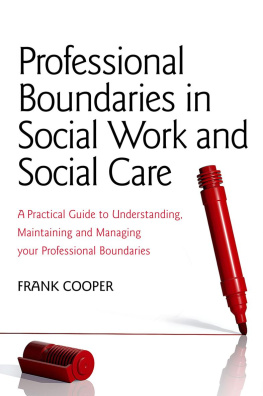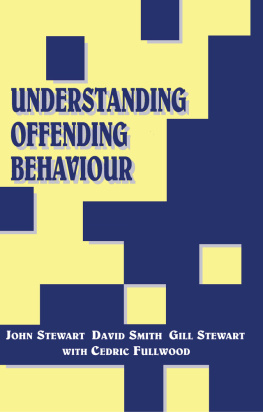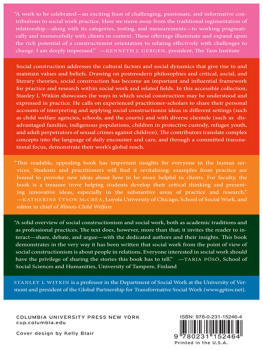Transforming Behaviour
First published 2010 by Willan Publishing
This edition published 2014 by Routledge
2 Park Square, Milton Park, Abingdon, Oxon OX14 4RN
711 Third Avenue, New York, NY 10017
Routledge is an imprint of the Taylor & Francis Group, an informa business
Sally Cherry 2010
The rights of Sally Cherry to be identified as the author of this book have been asserted by her in accordance with the Copyright, Designs and Patents Act of 1988.
All rights reserved; no part of this publication may be reproduced, stored in a retrieval system, or transmitted in any form or by any means, electronic, mechanical, photocopying, recording or otherwise without the prior written permission of the Publishers or a licence permitting copying in the UK issued by the Copyright Licensing Agency Ltd, Saffron House, 610 Kirby Street, London EC1N 8TS, UK.
ISBN 978-1-84392-927-7 paperback
978-1-84392-928-4 hardback
British Library Cataloguing-in-Publication Data
A catalogue record for this book is available from the British Library
Project management by Deer Park Productions, Tavistock, Devon
Typeset by GCS, Leighton Buzzard, Beds
Contents
This second edition of Transforming Behaviour: Pro-social modelling in practice continues to be influenced by the work of Chris Trotter who has been my starting point when developing my thinking about pro-social modelling.
Many people have helped me to develop my understanding of pro-social modelling in practice. First and foremost are those participants from many organisations, on many courses, who have participated enthusiastically and have openly shared their experiences with me. Particular thanks must go to the staff and managers of the eight hostels involved in the National Probation Directorates Approved Pathfinder 20022004 who helped propel me along this journey. I have worked with many wise and experienced co-trainers when running pro-social modelling courses and we have all shared in the development of thinking on this topic.
I remain indebted to the people who helped me with the first edition, especially Len Cheston and Charlie Watson, and also Sarah Ackroyd, Jane Allen, Rob Canton, Clare Cherry, Roger Clare, Gill Kelly, Louison Ricketts and Bernadette Wilkinson, and must mention those who have helped me to develop my thinking for this edition, especially Francis Cowe and Tony Osbourne, the people who I interviewed for the final chapter, and yet more course participants. Thanks also must go to Brian Willan who not only took me on as a complete unknown but has also asked me to write this second edition.
Finally, and most of all, I would like to thank my family Dick, Florence and Susanna.
Note: For training and consultancy in pro-social modelling Sally Cherry can be contacted at
A note on language
The majority of my experience is within the criminal justice system where we usually refer to our clients as offenders. The language we use has important symbolic meaning and the term offender is indicative of current thinking that says probation, prisons, etc., are part of the corrections system and exist to deal explicitly and unequivocally with offending behaviour and towards the cessation of that behaviour. This use of the term offender can be criticised as labelling people and implying that they cannot change. Pro-social modelling is applicable outside the criminal justice system in any setting where practitioners are working with people they are trying to encourage to behave pro-socially; this might include school children, children looked after by the local authority, groups in the community, or young people within the youth justice system (where there is heavy emphasis on the prevention, as well as the reduction, of criminal behaviour). So in the quest for a relatively neutral term I have used client in this book except where I specifically use examples drawn from criminal justice.
The stories and case studies
All of the stories in this book are based on real life examples, often those described by participants on courses. Apart from the account at the very beginning of the book which has been reported exactly as it happened, names and situations have been changed in order to preserve anonymity. So if you think you recognise your story in this book you might be right but on the other hand, you might not!
Foreword
by Dr Chris Trotter
It is with great pleasure that I write the foreword to Transforming Behaviour: Pro-social modelling in practice. Pro-social modelling has been demonstrated to be one of the key skills in effective work with offenders and other involuntary clients. The more we talk about it, the more we write about it and the more we learn about it, the greater the benefits will be for our clients, for direct practice workers and for the community. For this reason this book on pro-social practice is most welcome.
The book provides another perspective on pro-social modelling, an approach to work with involuntary clients developed in Working with Involuntary Clients and Helping Abused Children and their Families. It makes a real contribution to our knowledge about how to do pro-social practice which is defined broadly to incorporate a range of different techniques or models, including reflective listening, motivational interviewing, solution focused work and cognitive behavioural approaches.
The book includes numerous anecdotes and stories taken from the authors own experience in direct practice work with offenders and as a trainer. This helps to make the book enjoyable to read and grounded in the day to day work of probation officers and others in this field.
The book works through the various skills of empathy, use of authority, assertiveness, motivating the unwilling client, problem solving and being a pro-social manager. It also includes a number of exercises to help readers develop their skills in pro-social practice. Sally Cherry is a practitioner and trainer rather than an academic, nevertheless the book contains references to many of the research studies which support pro-social modelling.
I thoroughly recommend this book to anyone wishing to develop their skills in working with offenders and other involuntary clients.
Associate Professor
Monash University
I have seen pro-social modelling transform the behaviour of staff and prisoners. Prison officers who learn to work pro-socially develop more rewarding and less tense relationships with prisoners. The prisoners who are treated pro-socially respond by behaving better so everybody wins.
Manager in a prison
1. Introduction
Listener serving a long sentence in a local prison: I tell people that if you need to you can talk to the prison officers too. Things have really changed here in the last few years. You really know now that staff are interested in you and they will listen to what you have to say.
Visitor: How do you know that?
Listener: They call you by your name and say please and thank you now.
(Listeners are prisoners trained by the Samaritans to support other prisoners.)
This encounter was real I was the visitor. I was taken to the First Night (induction) wing and invited to talk to anyone I wanted to. This was a Victorian prison, built for the containment and punishment of those whom many people wanted out of sight and out of mind. When I was a probation officer I could hardly bear to stay in the place long enough to interview a couple of people before I returned to freedom. The prison officers there still have to manage and control difficult people locked away in large groups; however, there has been a huge culture shift in the last few years.






